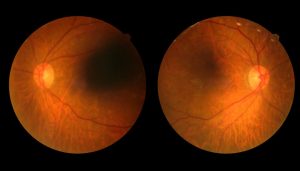Introduction
Diabetes is a widespread health concern affecting millions of people worldwide, with complications that extend beyond blood sugar levels. One such serious complication is diabetic retinopathy, a condition that can lead to vision impairment or even blindness if left untreated. Understanding how diabetes affects your eyes, recognizing the warning signs, and seeking early treatment can significantly reduce the risk of vision loss. In this blog, we will explore the causes, symptoms, treatment options, and preventive measures for diabetic retinopathy.
What is Diabetic Retinopathy?

Diabetic retinopathy is a diabetes-related eye disease that affects the blood vessels in the retina—the light-sensitive tissue at the back of the eye. High blood sugar levels damage these blood vessels, causing them to leak, swell, or close off, which can lead to vision problems.
Types of Diabetic Retinopathy
- Non-Proliferative Diabetic Retinopathy (NPDR): The early stage where blood vessels weaken, leading to small leaks, causing swelling and deposits in the retina.
- Proliferative Diabetic Retinopathy (PDR): The advanced stage where new, abnormal blood vessels grow in the retina, increasing the risk of severe vision loss and blindness.
Causes and Symptoms of Diabetic Retinopathy
Causes
- High Blood Sugar Levels: The primary cause, as prolonged high glucose damages retinal blood vessels.
- Hypertension: High blood pressure further accelerates damage to the eyes.
- High Cholesterol: Excess fat in the blood can worsen retinal damage.
- Long-term Diabetes: The longer you have diabetes, the higher the risk of developing retinopathy.
Symptoms
In the early stages, diabetic retinopathy may not show any noticeable symptoms. However, as the condition progresses, symptoms may include:
- Blurred or fluctuating vision
- Dark or empty areas in your sight
- Poor night vision
- Colors appearing faded
- Sudden vision loss
Treatment Options for Diabetic Retinopathy
1. Controlling Blood Sugar and Blood Pressure
Maintaining a healthy blood sugar level is the first step in preventing or slowing the progression of diabetic retinopathy. Lifestyle changes such as regular exercise, a balanced diet, and proper medication can help keep diabetes under control.
2. Laser Treatment (Photocoagulation)
Laser therapy is used to seal leaking blood vessels or shrink abnormal growths in the retina. This procedure helps prevent further damage and vision loss.
3. Anti-VEGF Injections
Anti-vascular endothelial growth factor (VEGF) injections help reduce swelling in the retina and prevent the formation of abnormal blood vessels. This is an effective treatment for diabetic macular edema, a complication of retinopathy.
4. Vitrectomy Surgery
In severe cases, a vitrectomy may be performed to remove blood or scar tissue from the retina. This surgery helps restore vision and prevent further deterioration.
Prevention and Expert Recommendations
Tips to Protect Your Vision
- Regular Eye Exams: Annual comprehensive eye exams can detect diabetic retinopathy early and prevent complications.
- Healthy Diet: Eat a diet rich in vegetables, fruits, and whole grains while limiting processed foods and sugar intake.
- Quit Smoking: Smoking increases the risk of diabetes-related complications, including eye diseases.
- Exercise Regularly: Physical activity helps regulate blood sugar levels and improves overall health.
Expert Eye Care at Laxmi Eye Hospital
Laxmi Eye Hospital is one of Mumbai’s most trusted chains of eye hospitals, providing top-tier eye care services for over 30 years. Known for its excellence in ophthalmology, Laxmi Eye Hospital has a team of highly experienced eye doctors committed to transparent and advanced treatment.
Specialized Services Offered:
Laxmi Eye Hospital specializes in advanced eye care services, including Specs Removal / LASIK (Bladeless LASIK, ICL & IPCL, Contoura Vision LASIK), Cataract Surgery, Glaucoma Treatment, and Diabetic Eye Care for early detection and management of diabetic retinopathy. The Cornea Clinic provides treatment for common corneal diseases, Keratoconus Management, and Eye Donation support. Additionally, the hospital offers Retina Treatment for retinal disorders and Pediatric Ophthalmology for children’s eye health, ensuring comprehensive eye care for all ages.
Clinic Locations & Contact Details:
- Laxmi Eye Clinic (Dombivli): SS Business Park, Gharda Circle, Dombivli East, Mumbai, Maharashtra 421201
- Laxmi Eye Clinic (Kharghar): Anant CHS, Plot 31, Sector 04, Kharghar, Navi Mumbai, Maharashtra 410210
- Laxmi Eye Hospital & Institute (Panvel): Mulla Hamid Rd, Old Panvel, Navi Mumbai, Maharashtra 410206
- Laxmi Eye Institute (Kamothe): Near ICICI Bank, Kamothe, Navi Mumbai, Maharashtra 410209
To book an appointment, visit Laxmi Eye Institute or call the nearest branch.
Frequently Asked Questions (FAQs)
1. Can diabetic retinopathy be reversed?
Early-stage diabetic retinopathy can be managed with proper blood sugar control, but advanced stages may require medical treatments.
2. How often should diabetic patients get their eyes checked?
Diabetic patients should undergo a comprehensive eye exam at least once a year or as recommended by their doctor.
3. Is diabetic retinopathy painful?
No, diabetic retinopathy is typically painless, which is why regular eye exams are crucial for early detection.
4. Can I prevent diabetic retinopathy?
Yes, maintaining good blood sugar control, a healthy diet, and regular eye check-ups can significantly reduce the risk.
5. What is the best treatment for diabetic retinopathy?
Treatment depends on the severity. Mild cases may require monitoring, while severe cases may need laser therapy, injections, or surgery.
6. Does diabetic retinopathy affect both eyes?
Yes, it usually affects both eyes, although the severity may vary between them.
7. Are there any lifestyle changes to help with diabetic retinopathy?
Yes, a healthy diet, regular exercise, quitting smoking, and controlling blood sugar levels are essential for managing the condition.
8. What happens if diabetic retinopathy is left untreated?
Untreated diabetic retinopathy can lead to severe vision loss or even blindness.
Conclusion
Diabetic retinopathy is a serious yet preventable complication of diabetes. Early detection and timely intervention are crucial in preserving vision. If you or a loved one has diabetes, regular eye check-ups and a proactive approach to diabetes management can safeguard your eyesight. For expert consultation and advanced treatment, visit Laxmi Eye Hospital and take the first step towards healthy vision.

